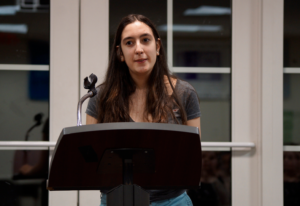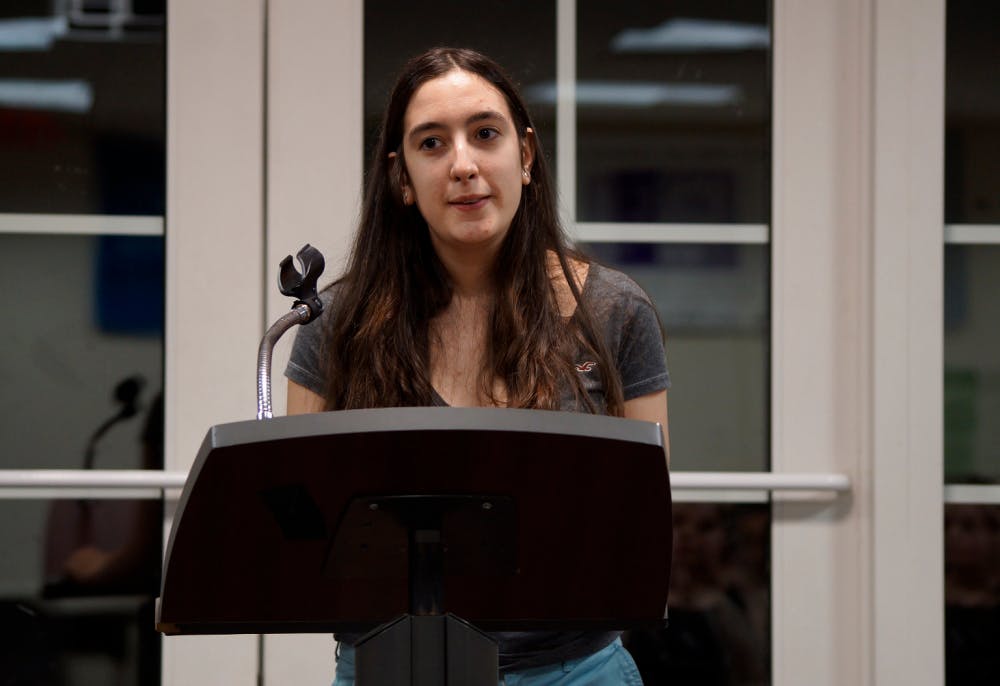By Shannon Deady
Staff Writer
Despite usually being a stranger to the person beside them, an intimate atmosphere of understanding and support filled the dimly lit basement of the Business Building as students gathered to share the raw details of their most personal stories.
Sexual assault survivors spoke about their experiences at the annual Take Back the Night event on Tuesday, April 18. While each story was different, they all shared one common theme: empowerment.
Traditionally, the event has begun with a peaceful protest in which students reclaimed their right to walk safely at night, free from the threat of sexual assault or violence. This year, however, this iconic portion of the event was cut.
“Marching was not the focus we want anymore. We wanted to create a safer, more open space for those who wanted to tell their story,” said Abbey Moor, vice president of Women In Learning and Leadership and a sophomore special education and women’s, gender and sexuality studies double major.
WILL successfully created a welcoming space. More students spoke this year than in years prior.
Alison Daks, program coordinator at Womanspace, a nonprofit that provides services to individuals and families impacted by domestic and sexual violence, kicked off the event.

The cost of rape has a large physical impact on society and survivors, according to Daks.
The economic burden of a rape survivor throughout the course of their lifetime is estimated to be $122,000, including health implications, criminal justice costs and lost productivity. This doesn’t include the emotional burden, though.
With 25 million survivors in the U.S. alone, the nation needs to spend more money on prevention and ways to help survivors, according to Daks.
At Womanspace shelters and hospitals, Daks often interacts with survivors of sexual assault. Time and time again, Daks has seen the effect an assault has on survivors.
“The impact on every individual who has experienced sexual assault is just that — individual,” Daks said. “What we know, what we hear from survivors, is that there was a me before the experience and there is a me after the experience.”
For survivors who are learning to cope, the event gave students a way to express their experiences.
A sophomore psychology major spoke about how last year’s event — where she told her story for the first time — has impacted her.
“It was only until this event last year when I approached the podium — my heart in my throat — and poured a very nonsensical version of this story to the audience,” she said. “Afterward other people and other survivors spoke to me, they empathized and understood. That connection was something that I needed for so long.”
Six other survivors shared their stories through tears, smiles and even some laughs. Each speaker reminded the audience that being a victim of sexual assault has nothing to do with strength.
Most students know to carry pepper spray, not walk home alone and say no, but it isn’t always that simple. Sexual assault can happen to anyone, even the strongest of people.
Fear of negative reactions from peers or being accused of lying are the biggest reasons that college students choose not to report their sexual assaults.
As a result, another common theme among the speakers was the importance of knowing how to respond to a friend who thinks they may have been assaulted.
The anecdote, told by Molly Knapp, a sophomore women’s, gender and sexuality studies major, is simple. Just say three things: “I’m sorry,” “I believe you” and “How can I help?”
Frankie DiMedio, a sophomore elementary education and women’s, gender and sexuality studies double major who attended the event, was left with an everlasting memory of this anecdote.
“More students need to come out to events like this. It is more popular of a problem than we even realize on college campuses,” she said. “(The event) was such an eye-opening experience for me.”







